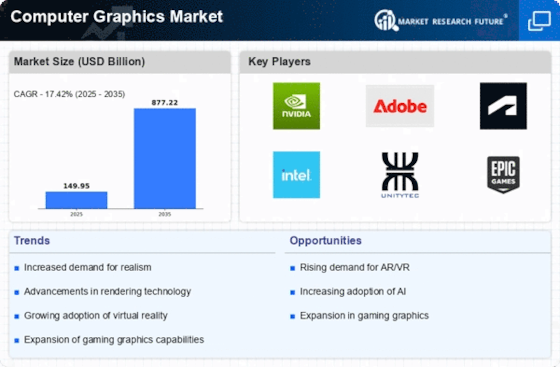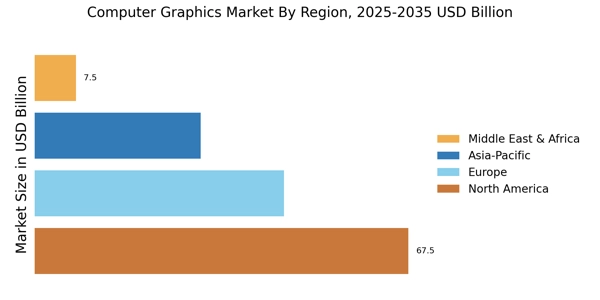Expansion of the Gaming Industry
The Computer Graphics Market is significantly influenced by the expansion of the gaming industry, which continues to thrive as a major entertainment sector. With The Computer Graphics Market projected to exceed 200 billion dollars by 2023, the demand for high-quality graphics is at an all-time high. Game developers are increasingly focusing on creating visually immersive experiences, which necessitates advanced graphics rendering techniques. This trend is likely to drive innovation within the Computer Graphics Market, as companies strive to meet the evolving expectations of gamers. The interplay between gaming and graphics technology is expected to foster further growth and development in this sector.
Increased Adoption of Augmented Reality
The Computer Graphics Market is witnessing increased adoption of augmented reality (AR) across multiple sectors, including retail, education, and healthcare. AR applications require sophisticated graphics rendering to create immersive experiences that blend digital content with the real world. The AR market is expected to grow significantly, with estimates suggesting it could reach 100 billion dollars by 2024. This growth is likely to stimulate demand for advanced graphics solutions, thereby propelling the Computer Graphics Market forward. Companies are investing in AR technologies to enhance user engagement and improve operational efficiency, which may further solidify the role of computer graphics in various industries.
Advancements in Graphics Processing Units
The Computer Graphics Market is experiencing a notable surge due to advancements in Graphics Processing Units (GPUs). These technological improvements enhance rendering capabilities, allowing for more complex and realistic graphics in various applications, including gaming, film, and virtual reality. The market for GPUs is projected to reach approximately 200 billion dollars by 2026, indicating a robust growth trajectory. As GPUs become more powerful and efficient, they enable developers to create visually stunning content that meets the increasing demands of consumers. This trend is likely to drive further investment in the Computer Graphics Market, as companies seek to leverage cutting-edge technology to gain a competitive edge.
Emergence of 3D Visualization Technologies
The Computer Graphics Market is experiencing a transformative phase with the emergence of 3D visualization technologies. These technologies are being adopted across various fields, including architecture, engineering, and medical imaging, to create realistic representations of complex data. The market for 3D visualization is anticipated to grow significantly, with projections indicating a potential value of 30 billion dollars by 2025. This growth is likely to enhance the demand for sophisticated graphics solutions, thereby propelling the Computer Graphics Market. As industries increasingly recognize the value of 3D visualization in decision-making processes, the integration of advanced graphics technologies is expected to become more prevalent.
Rising Demand for High-Quality Visual Content
The Computer Graphics Market is driven by the rising demand for high-quality visual content across various platforms, including social media, streaming services, and video games. As consumers increasingly expect visually appealing and engaging content, businesses are compelled to invest in advanced graphics technologies. The market for visual content creation tools is projected to grow at a compound annual growth rate of over 10% through 2025. This trend indicates a strong correlation between consumer preferences and the evolution of the Computer Graphics Market. Companies that prioritize high-quality graphics are likely to attract and retain customers, thereby enhancing their market position.


















